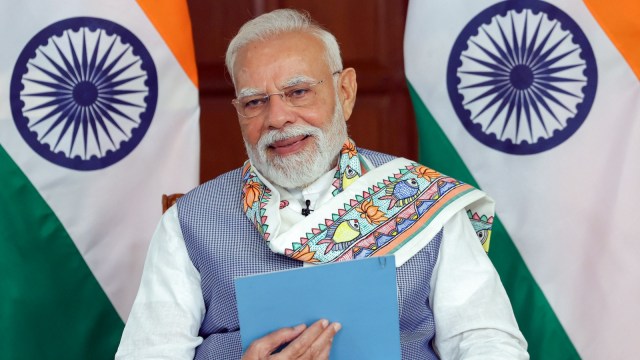
The day. I returned home last week after a long sojourn in one of the most developed countries in the world, I spotted a statement by our Prime Minister that worried me. It sounded ambitious and optimistic but slightly illusory and it was this that worried me. Modi was in Andhra Pradesh and as his custom when he visits temples, he was in the saffron robes of a Hindu priest and speaking not of religion but of his favourite dream for India. The 21st century, he said, would belong to 1.4 billion Indians because he could say with certainty that by 2047, India would become a fully developed country.
This is not something he has said for the first time. He has said it many times before. The reason why it had special meaning for me this time was because on the flight home, between watching the latest offerings from Hollywood, I happened to read the latest copy of The Economist that I bought at Zurich airport. It had the Gaza peace deal on the cover with the caption ‘A New Beginning’ but instead of reading this story, I searched as I always do in western newspapers for stories on India. There was one, buried deep inside in the section on finance and economics and its first line asked how rich a country needed to be to count as ‘developed’.
The story intrigued me because from it I learned that there was no concept of developed and developing countries untill 1949, when Harry Truman in his inaugural speech split the world into first, second and third. First being those countries aligned with America, second being those aligned with the communist world and third being us very poor countries who aligned with neither block. What intrigued me more was the information that today the World Bank considers a country developed when the national income per person reaches $14,000. The Economist calculates that ‘this would require India’s GDP to quintuple in the next 22 years at a growth rate of 7.5% a year, above the average of 5.7% seen so far under Mr. Modi.’
In plain English, this means that India is still a long, long way from being a fully developed country despite our Prime Minister selling us this happy but perhaps deluded dream. Dreams are good, even deluded ones. Especially in this season when we celebrate Goddess Lakshmi and hope and pray that if we light up our homes and fill the air with the sound of firecrackers, she will be kind enough to not just visit but stay. Diwali is one of my favourite festivals and this is one of my favourite seasons, so I am not going to write a gloomy piece about how hard it is for India to become a fully developed country. Instead, what I would like to write is a realistic, optimistic piece about where we are and where we need to go from here.
Whenever I write about economic things, I am attacked virulently by ‘economists’ who warn me that I should stay away from the subject because I lack their learning and expertise. They forget that the most important political issues in India are economic. Our political leaders like to distract voters by creating ugly and dangerous divisions at election time between upper and lower castes, Hindus and Muslims. But when I talk to ordinary voters, I find always that what they really want are jobs that would enable them to escape the degradation in which they mostly live. The ‘experts’ like to say that there are more than enough jobs and that it is only government jobs that Indians want because there is guaranteed job security.
Maybe. But government jobs also come with perks like a decent house in which to live equipped with subsidised electricity, water and cooking gas. So, it should not surprise us that there were 187 million applicants for 64,197 railway jobs last year. Nor should it surprise us that young people sometimes pay with their lives while being recruited for jobs in the army and the police. This does not happen in ‘developed’ countries and it should not be happening in a country that seeks to become developed when we complete a century of shaking off the shackles of the British Raj.
It is my sincere effort to write a column that is not seen as politically aligned and this is why I have said more than once that I have not been a ‘Modi bhakt’ for a while. I have said this before but continue to be trolled by Dynasty devotees for being a ‘bhakt’. I have no hesitation in admitting that I became a Modi bhakt in 2013 because I believed that he would finally rid India of the Nehruvian socialism that kept most Indians mired in extreme poverty for decades.
Modi could have done this by reducing the size of our bureaucracy and eliminating government departments. And he could have reduced the burden on taxpayers of government housing. He could also have made it much easier to do business in India than he has. He could have ordered BJP chief ministers to drastically improve government schools and healthcare. Then we may have been speeding along the developed country road. Instead, we remain a country that forever remains a country with immense ‘potential’. Happy Diwali to one and all.